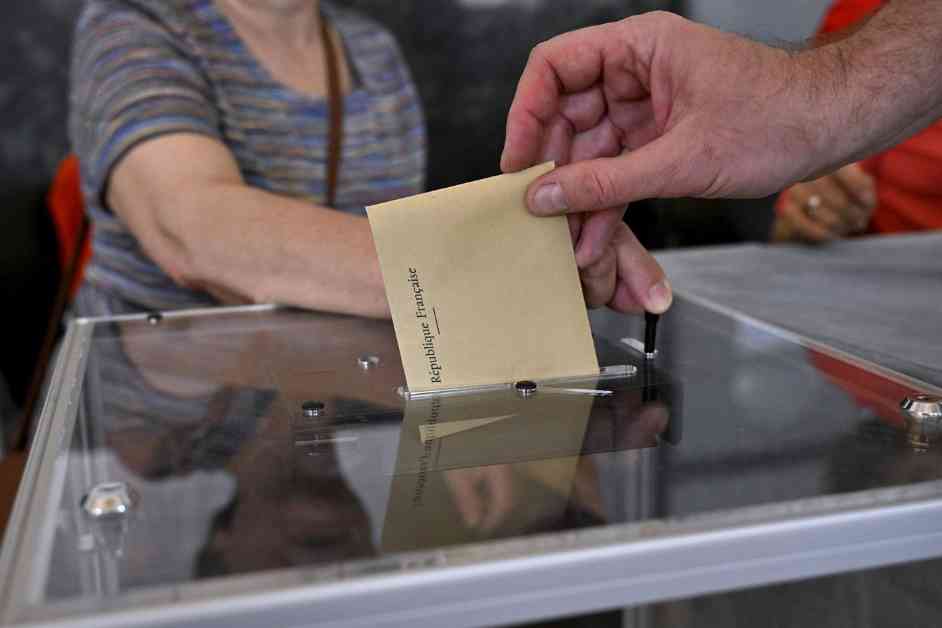A significant increase in the vote of practicing Catholics for far-right lists. This is one of the major findings of the Ifop survey for La Croix, conducted on Sunday, June 9 for the 2024 European elections. Nearly a third of practicing Catholics (32%) voted for the list led by Jordan Bardella – a score very close to the overall French population, which even rises to 37% for all Catholics. This is a much higher number compared to the 14% obtained by Jordan Bardella among practicing Catholics in the 2019 European elections.
The shift of the practicing Catholic electorate towards the far right is also evident in the score of the Reconquête! list led by Marion Maréchal, who strongly emphasized the defense of “Christian identity” during her campaign: 10%, while nationally it stands at 5.5%. As a result, the votes garnered by the far right in the European elections more than doubled: 42% in 2024, compared to 18% in 2019. This score is very close to the 40% obtained in this electorate when combining the results of Marine Le Pen, Éric Zemmour, and Nicolas Dupont-Aignan for the 2022 presidential election.
The “de-demonization” strategy of the RN
“We are witnessing a very strong evolution of the Catholic electorate, marked by two major underlying trends that have emerged since the 2017 presidential election and confirmed in 2022,” analyzes Jérôme Fourquet, director of opinion and strategy at Ifop. “There is no longer any resistance to the far right, except among the very small, core group of regular practicing Catholics (2) who vote for Jordan Bardella.” The pollster points out that just seven years ago, François Fillon, the LR candidate in the presidential election, captured almost one out of every two practicing Catholics (46%) in the first round.
How to explain this “trend”? “The rise of the RN in this electorate was made possible by the strategy of de-demonization and ‘respectability,’ notably the tie-wearing strategy in the National Assembly,” analyzes Jérôme Fourquet. “Whether rightly or wrongly, the image of the party has evolved significantly.” Moving away from the “sultry and radical” side of the Jean-Marie Le Pen era, which served as a repellent.
“We can note the little influence of magisterial speech on this type of electoral behavior despite very clear texts from the bishops,” observes Philippe Portier, a sociologist of religions. He cites, for example, the pastoral letter entitled “A New Breath for Europe,” published in early April by the bishops of eight dioceses in the Euregio (Germany, Belgium, France, and Luxembourg), which urged to “choose candidates who support the European project.” Or the statement by the Permanent Council of the French Bishops’ Conference on the occasion of the commemoration of the 80th anniversary of the D-Day landings.
The right and the presidential majority struggling
This shift towards the far right comes at the expense of the governing right. A self-proclaimed Catholic, François-Xavier Bellamy, certainly obtained a significantly higher score among practicing Catholics than nationally – 14% compared to 7.25% – but failed to reverse the trend of disaffection for the Republicans. He actually lost eight points in the same electorate compared to 2019. Another striking fact is the collapse of the vote for the presidential majority. Highly mobilized, practicing Catholics had voted 37% for Nathalie Loiseau in the previous European elections, which reflected an attachment to the community project. Five years later, the list led by Valérie Hayer only convinced 12% of practicing Catholics – 16% of all Catholics.
“The attachment to the European Union, following Christian democracy or Jacques Delors, exists among Catholics, but these currents are losing momentum,” assures Jérôme Fourquet. “Just as 28% of regular practicing Catholics voted for left-wing lists. But today, the dividing lines are different and touch on issues of security, identity, or the relationship with Islam.” Among the decisive issues for their vote, practicing Catholics, whose turnout is more than 20 points above the national average, have mentioned more than the overall French population issues such as the fight against terrorism, illegal immigration, security, but also education, and France’s place in the European Union.
Additional Information:
The French far-right party, RN, has seen a significant increase in support from practicing Catholics in the 2024 European elections compared to previous years. This shift towards the far right has been attributed to the party’s de-demonization strategy and efforts to appeal to voters on issues such as security, identity, and the relationship with Islam.
Despite efforts by religious authorities to influence the electoral behavior of practicing Catholics, the influence of their recommendations seems to be limited. The results of the elections reflect a changing political landscape where issues such as security, identity, and immigration play a significant role in shaping voter preferences.
The decline in support for traditional center-right parties and the presidential majority suggests a growing disillusionment among practicing Catholics with mainstream political movements. This trend highlights the evolving nature of political affiliations and the importance of addressing key concerns such as security, identity, and the role of France in the European Union to appeal to this segment of the electorate.


















